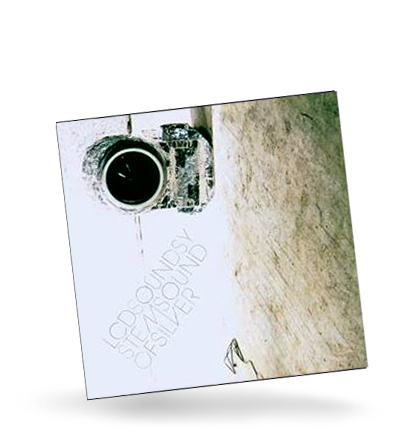Macy Gray
Big
Released March 27

Mr. Wrongs outnumber nice guys on Big, Macy Gray's first new album since 2003. That's good, since Gray sounds best when romance gets complicated. Her scratchy, quivery voice mixes comedy, vulnerability and willfulness, and she is grounded in the storytelling tradition of Southern soul music, which means she brings out the words and drama before her vocals cut loose.
Yet the stories she sings are anything but classic, whether she is complaining to a cheating man with "You're so stereotypical" in Okay or shooting her man for insurance money in Strange Behavior. She tells a purely materialistic lover that he ought to Treat Me Like Your Money, and she apologizes to her children for earning her living on the road in What I Gotta Do. In Finally Made Me Happy, she belts and scat-sings over the lavish strings and horns of a romantic ballad, but she is singing about a man who made her happiest "when you walked out that door."
On previous albums Gray backdated her music toward 1960s soul. This time she wrote with new producers who relocated her music closer to current R&B, including will.i.am of the Black Eyed Peas and Justin Timberlake. The songwriting by committee cuts back on the zany streak Gray showed in older songs like Relating to a Psychopath and leads to one bit of posturing, Ghetto Love, that she manages to redeem with a vocal that flutters proudly against the grain.

The upside of the collaborations is in their well-turned melodies and tracks that mix the crisp and the lush. Timberlake's ingenuity, and his admiration for Prince, come through in the stripped-down funk of Get Out, which precisely aligns distorted keyboards, rock guitar, brief backup vocals and Gray's homage to James Brown's scream. And it is a song about escaping an abusive man.
Big purposefully grooms Gray for current R&B radio. But it does not hold back her personality or her odd, indelible voice.

The Fratellis
Costello Music
Released March 13

Along with buzz bands the Gorillaz and the Caesars, Scottish pop-punk trio the Fratellis busted out of obscurity thanks to their presence on a too-cool iPod commercial. That featured cut, rowdy pub howler Flathead, is no doubt gamboling in your brain this very moment. Sip a little single malt and that sucker will pop right out.
Jon, Barry and Mince Fratelli aren't really brothers, and they aren't really named Fratelli. So there's a Ramones thing going on here in more ways than one: three faux sibs thrashing about with a sneaky sense of melody and beer on their high-tops. The energy and the accents are infectious, and there's just enough brains in the bottom of the glass to keep you coming back.
LCD Soundsystem
Sound of Silver
Released March 20
LCD Soundsystem's James Murphy is a very famous man that many people have only heard of by osmosis. His first, self-titled, album didn't exactly sell platinum quantities. Rather, roughly five years ago, at the controls of production duo DFA, Murphy wrenched New York City out of a deep blue fun-free funk and made it dance again. The Gossip's Standing in the Way of Control would not sound like it does were it not for The Rapture's House of Jealous Lovers — a seminal DFA production, and the official opening theme of the trans-Atlantic indie dancefloor boom.
Janet Jackson's people, Britney's people — hell, everybody came calling, but the "indie Neptune" Murphy demurred. Instead, vinyl freaks (and anyone else in earshot) were floored by Murphy's opening solo salvo, LCD's Losing My Edge. To a krautrock-electro pulse, he wryly charted the rise and fall of every cool vogue in music, and his narrator's weakening grasp on the pulse.
Nothing could have been further from the truth. But keeping his cool intact has meant this dour-faced 36-year-old has gone underpaid, never quite reaping the rewards that LCD deserves. It's a pattern of Murphy's: he lost out on millions when he bailed from a soon-to-be-successful Internet startup, and then turned down a chance to write Seinfeld scripts.
So with LCD LP number two, Sound of Silver, he makes a bid for the slightly bigger time with sad songs, slow-burning epics, wolf howls and more peerless dance floor come-hithers. Sublime opener Get Innocuous builds exquisitely, before Murphy's vocals (multi-tracked, Bowie-referencing) descend like a cloud of dank nitrous oxide. Oh block out the sun, comes as another vocal ambush, like Berlin-period Bowie in a cowbell shop this time, on the propulsive Us v Them.
The album's beating heart, however, is All My Friends, where the nostalgic euphoria of the ageing clubber becomes something more authentically soulful. If Murphy truly wanted the big bucks, he would know how to print them. Instead, Sound of Silver tickles the back of the knees while titillating the solar plexus. It should earn him a lasting place on the shelf next to his heroes.
Enter Shikari
Take to the Skies
Released March 19
Enter Shikari are not like other bands. Their music brings grown-ups out in hives; not an easy thing to do in these days of endless middle youth. Last fall, Shikari sold out a major London venue without the muscle of a record contract. They are going to sell lots of records without one, too.
When the A&Rs did come calling, Enter Shikari — four twenty-nothings from Hertfordshire, north of London — turned them all down. They chose to release their debut on their own label. This is the kind of behavior that has the majors nursing ulcers.
Enter Shikari borrows equipment and poses from the swivel-eyed rave scene, and dreamy synth builds from its cheesy cousin, trance. They are, though, a chuntering rock band at heart. Trying to pin a name on Shikari's bi-polar racket is all part of the fun. One music newspaper weekly tried "mosh and glo." It doesn't much matter what we're calling it, as long as the fans dance like gibbons and grown-ups cover their ears.
On OK Time for Plan B, the band roars like hairy oxen, while a perky rave synth beebles away. No Sssweat starts off like mangy oi-punk, before a synth-pop-disco band hijack it. Teenagers have notoriously short attention spans: Enter Shikari alter their time signature every few bars. It's exhilarating on Return to Energizer, but it means they never build a satisfying musical argument.

One of the biggest sore spots in Taiwan’s historical friendship with the US came in 1979 when US president Jimmy Carter broke off formal diplomatic relations with Taiwan’s Republic of China (ROC) government so that the US could establish relations with the People’s Republic of China (PRC). Taiwan’s derecognition came purely at China’s insistence, and the US took the deal. Retired American diplomat John Tkacik, who for almost decade surrounding that schism, from 1974 to 1982, worked in embassies in Taipei and Beijing and at the Taiwan Desk in Washington DC, recently argued in the Taipei Times that “President Carter’s derecognition

This year will go down in the history books. Taiwan faces enormous turmoil and uncertainty in the coming months. Which political parties are in a good position to handle big changes? All of the main parties are beset with challenges. Taking stock, this column examined the Taiwan People’s Party (TPP) (“Huang Kuo-chang’s choking the life out of the TPP,” May 28, page 12), the Democratic Progressive Party (DPP) (“Challenges amid choppy waters for the DPP,” June 14, page 12) and the Chinese Nationalist Party (KMT) (“KMT struggles to seize opportunities as ‘interesting times’ loom,” June 20, page 11). Times like these can

June 23 to June 29 After capturing the walled city of Hsinchu on June 22, 1895, the Japanese hoped to quickly push south and seize control of Taiwan’s entire west coast — but their advance was stalled for more than a month. Not only did local Hakka fighters continue to cause them headaches, resistance forces even attempted to retake the city three times. “We had planned to occupy Anping (Tainan) and Takao (Kaohsiung) as soon as possible, but ever since we took Hsinchu, nearby bandits proclaiming to be ‘righteous people’ (義民) have been destroying train tracks and electrical cables, and gathering in villages

Dr. Y. Tony Yang, Associate Dean of Health Policy and Population Science at George Washington University, argued last week in a piece for the Taipei Times about former president Ma Ying-jeou (馬英九) leading a student delegation to the People’s Republic of China (PRC) that, “The real question is not whether Ma’s visit helps or hurts Taiwan — it is why Taiwan lacks a sophisticated, multi-track approach to one of the most complex geopolitical relationships in the world” (“Ma’s Visit, DPP’s Blind Spot,” June 18, page 8). Yang contends that the Democratic Progressive Party (DPP) has a blind spot: “By treating any